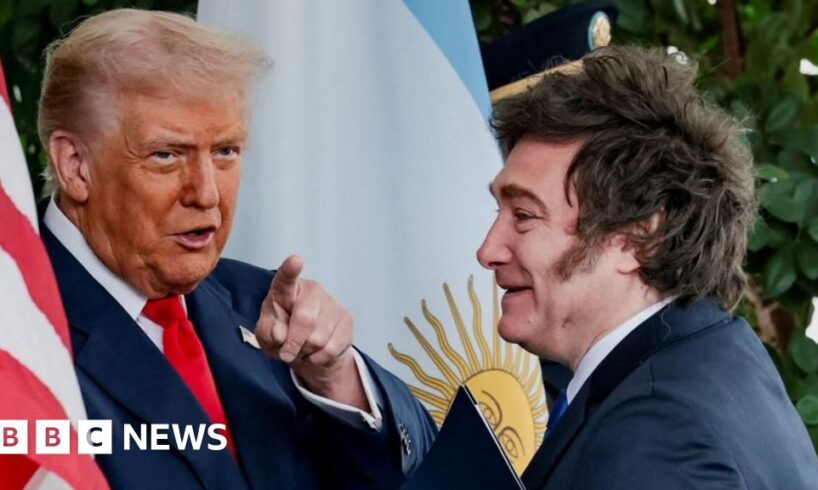
President Donald Trump has acknowledged that a $20bn (£15bn) US lifeline to help calm Argentina’s currency crisis is an attempt to sway legislative elections this month in the South American nation.
Welcoming Argentina’s libertarian leader Javier Milei to the White House, Trump warned that the US would not “waste our time” with helping Argentina if Milei’s party did not prevail.
Milei praised Trump for his peacemaking efforts and said the US president’s policies would lead to “prosperity”.
Argentina’s financial turmoil comes ahead of national midterm elections on 26 October, seen as a test of voters’ desire to continue backing Milei’s cost-cutting, free-market reform agenda.
As Trump sat across the table from his Argentine counterpart on Tuesday, he said the not-so-quiet bit out loud.
“The election is coming up very soon,” he said. “It’s a very big election.”
Trump added: “Victory [for Milei] is very important. Your poll numbers I hear are pretty good. I think they will be better after this.
“And, you know, our approvals are somewhat subject to who wins the election.”
A presidential election is not due in Argentina until 2027. But Trump said if “a socialist wins” then the US would feel “a lot differently” about supporting the South American nation.
“If he loses, we are not going to be generous with Argentina,” Trump said.
For his part, Milei blamed Argentina’s economic woes on his political adversaries.
“This liquidity problem that Argentina has is a result of the political attacks we have suffered from our opponents,” he told Trump.
Trump’s backing for his libertarian ally, who took office in December 2023, is no secret.
He said the bailout was “just helping a great philosophy take over a great country”, and the White House has framed it as supporting an important regional ally.
But Trump’s explicit linking of a recently announced $20bn currency swap between the US and Argentina to Milei’s electoral prospects is notable for an American president who has previously railed against foreign interference in elections.
In recent provincial elections in Buenos Aires, Milei’s La Libertad Avanza coalition (Freedom Advances) performed worse than expected, spooking markets as they watch for any sign his economic programme’s days might be numbered.
His party has recently been rocked by several corruption scandals.
If Milei’s party loses seats, or fails to gain more, in this month’s midterms – that could affect his government’s ability to pass further reforms.
Several key vetoes he has tried to make have already been overturned by Congress, where he doesn’t have a majority.
But will US support actually make a difference?
Argentine stocks fell after Tuesday’s news conference.
This intervention, which was supposed to stabilise the economy in Argentina, now seemed to hinge on Milei securing more political support.
And it seems the financial markets are unconvinced that Trump’s endorsement will be enough to boost Milei’s electoral chances.
This currency swap was, economically speaking, supposed to be a bit of a lifeline for Argentina’s currency – the peso, which has been losing value for years.
As a means to control inflation, Milei had been stopping the peso from devaluing too drastically by keeping it propped up with the country’s reserves.
The problem with that is that it drained reserves ahead of $20bn of debt due next year.
That led to fears, including among investors, that the country was heading for a financial crisis if it defaulted on its debts again.
Some thought that to avert this Milei might have to let the currency devalue drastically – which would lead to a spike in prices as people’s money would suddenly be worth less.
Many economists told me they thought this would be “political suicide”. So, perhaps the US intervention helps avoid that political disaster.
But is this really going to cut through to ordinary voters? Opinion polls suggest that some Argentines are tiring of Milei’s sharp austerity measures.
His supporters hail them for bringing down inflation and cutting the deficit.
But they’ve come at a social cost – with large cuts to pensions, education, health, infrastructure, and transport and utilities subsidies among other things.





